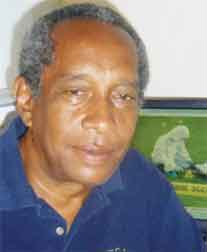
RECENTLY, statements have emanated from official circles which indicate positive movement in getting our closed forensic laboratory operational again. That is surely good news and long overdue for law enforcement, our justice system and treasury, as I have previously highlighted the mind-boggling situation that existed for the past twenty months with that state-of-the-art equipped specialist facility, its instrumentation virtually abandoned.
Our nearly EC$8 million forensic investment was at a crossroad with an uncertain future and clearly an unacceptable state of affairs that begged resolution. So while I sympathize with the government for inheriting that situation, the challenge became theirs. Again, I indicate that with all requirements, adjustments and impediments properly and transparently addressed, a phased reopening as indicated by the Minister for National Security and Home Affairs is the better option. Not to be taken lightly, though, it will require serious assessment, stocktaking and careful movement towards that necessary first step.
For me, and of continuing concern, is the management of all aspects of our crime scene operations. The crime scene is the most important and dynamic aspect of a criminal investigation and is the genesis of forensic case work. Consequently, all monies poured into establishing and maintaining our forensic laboratory must be protected by a proportionate investment in developing and maintaining a cadre of crime scene examiners and investigators, representative of a professional and efficiently-run crime scene unit. To have otherwise will only minimize on the benefits of the laboratory.
Now, it has taken a bold and apparently informed Minister for National Security to frankly spill out his displeasure at the level of our crime scene operations and rather than smother the truth or the reality, as is customary, he has highlighted same with the intention for corrective measures. For me, that type of openness was overdue as it is way past time for some serious rethink and action insofar as the examination of crime scenes is concerned. For the benefit of the investigative process, one then must hope that the Minister will be successful in his quest.
But there are important sides to the kind of gains the Minister is seeking. First and foremost is selection. Due to the additional harrowing nature of the job, crime scene officers must be of a particular mindset, passionate about their professional duties, well-trained and professionally current.
Further, crime scene units must be able to satisfy the high demands for both human and technical resources, particularly in fingerprinting, and for us this translates into more crime scene personnel and properly equipped with the necessary apparatus, technology and consumables. That continues to be a challenge for our crime scene department.
As a doubly applied field of work, crime scene operations thrive a lot on practical knowledge, experience and technology and so any imbalance will affect performance and success. For example, a continuing administrative error is the thinking that a once-in-a-blue-moon one-week training session will produce competent and ‘on the ball’ crime scene examiners. It just does not work that way, even worse where the intention is to groom crime scene investigators.
Well, Minister Francis is again fired up and this time about the laboratory being able to utilize its resources to extend to DNA paternity testing. I think the average citizen would certainly be in agreement and ask why not? I am not a DNA expert but I have never appreciated the reason(s) why a concerted effort had not previously been made to have the laboratory include testing for such an important civil (family) court need, more so in matters with criminal implications.
However, some light in the tunnel appears to be a new Laboratory Director who seems to appreciate the formula for improving the total of our forensics package. Frankly, all operations involving the crime scene, the mortuary where applicable and the forensic laboratory, will have to be coordinated in a much better manner and that will only be achieved by carefully strategizing the professional inputs of those areas.
The laboratory, by virtue of its resources, should be the pivot around which the other two services revolve. In that regard, I maintain that forensics is not a profession of magic with success via the wave of a wand. Rather, it involves a lot of detailed, tedious and coordinated work covering and subject to a range of applied scientific principles and legal requirements. Results of all such work then must be well understood, carefully assessed and properly coordinated for presentation at trial.
As a people, one of our shortcomings has been the failure to learn from the experiences, mistakes inclusive, of others, including those within our region. Further, administrators often either fail to seek or prefer to disregard sound professional advice given. A hard look at the forensic situation in sister islands with a much longer exposure than us should serve as a valuable source of information and guide moving forward, but only if we cared to. So in any new dispensation, we cannot afford complacency and the challenges as we prepare to move on are very clear.
The major ‘out house’ challenge will be to regain the trust and confidence of the scientific and legal communities and also the general public. The reality of the laboratory’s recent history will not be easily erased and the ability to successfully turn the corner will greatly help in steering it forward.
‘In house’ challenges will require a commitment to delivering a timely, scientifically sound and unbiased service to both victims and suspects/accused in criminal matters, in fact, the justice system on the whole. The integrity and credibility of its scientists/examiners will always be critical but once they are able to perform with the required levels of professionalism, then the reputation of the laboratory should grow from strength to strength.












